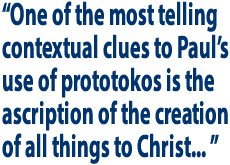 The Testimony of the Book of Abraham
The Testimony of the Book of Abraham
Certainly the most unique section of LDS Scripture is found to be the Book of Abraham, contained in the Pearl of Great Price. This work, Translated from the papyrus, by Joseph Smith is allegedly A Translation of some ancient Records, that have fallen into our hands from the catacombs of Egypt.The writings of Abraham while he was in Egypt, called the Book of Abraham, written by his own hand, upon papyrus.This is the description given by the LDS Scriptures themselves. The story of the Book of Abraham is fascinating, but beyond our scope [See Charles M. Larson, By His Own Hand Upon Papyrus (Grand Rapids, MI: Institute for Religious Research, 1992) for a recent examination of the Book of Abraham. See also, Jerald and Sandra Tanner, Mormonism: Shadow or Reality? pp. 294-369, and my own Letters to a Mormon Elder, pp. 157-168.] Its importance to our study lies in the final chapters of the book. Here we find what amounts to a rewrite of the opening chapters of the book of Genesis in the Old Testament. Only this time, the fact that Joseph Smiths theology has changed a good bit is only too clear.
Joseph worked on the Book of Abraham during two major periods, and the second period came later in his life (1842), after he had begun introducing the idea of a plurality of gods into the LDS Church. It is hardly surprising, then, that in translating the Egyptian papyri, Joseph discovered that Abraham himself had taught a plurality of gods. The reader is directed to chapters four and five of the Book of Abrahamfor a full accounting, but the first few verses are enough to give a flavor of the passage:
1 AND then the Lord said: Let us go down. And they went down at the beginning, and they, that is the Gods, organized and formed the heavens and the earth.
2 And the earth, after it was formed, was empty and desolate, because they had not formed anything but the earth; and darkness reigned upon the face of the deep, and the Spirit of the Gods was brooding upon the face of the waters.
3 And they (the Gods) said: Let there be light; and there was light.
4 And they (the Gods) comprehended the light, for it was bright; and they divided the light, or caused it to be divided, from the darkness.
5 And the Gods called the light Day, and the darkness they called Night. And it came to pass that from the evening until morning they called night; and from the morning until the evening they called day; and this was the first, or the beginning, of that which they called day and night.
6 And the Gods also said: Let there be an expanse in the midst of the waters, and it shall divide the waters from the waters.
7 And the Gods ordered the expanse, so that it divided the waters which were under the expanse from the waters which were above the expanse; and it was so, even as they ordered.
8 And the Gods called the expanse, Heaven. And it came to pass that it was from evening until morning that they called night; and it came to pass that itwas from morning until evening that they called day; and this was the second time that they called night and day.
By my count the phrase “the Gods” appears forty-six times in only two chapters of text here in the Book of Abraham, each time in capitalized form. Given the obvious dependency upon the text of the book of Genesis, Joseph’s point is all too clear and understandable. He would only two years later claim that the Hebrew term translated “God” in Genesis is mistranslated, and should be rendered in the plural. Whatever else we may say about the Book of Abraham, one thing is for certain: it presents the plurality of gods very, very clearly.



